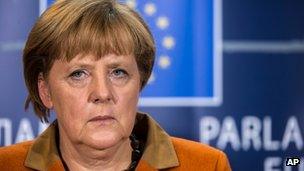Who should pick up the EU bill?
- Published

You know what it's like when you invite someone to dinner.
There's always the question of who pays. Should you split the bill or should the host pick up the tab? So it will be tonight at one of Westminster's most exclusive private dining rooms - in No 10, Downing Street - when David hosts Angela.
The bill in question is not, of course, for the meal which the British Prime Minister will share with the German Chancellor but for the EU as a whole for six years - around a trillion euros give or take the odd cent.
At the moment it's Angela Merkel - or, rather, German taxpayers - who pays the most. David Cameron and the hard working folk of Britain aren't far behind. We're the fourth largest contributors to the EU.
So, you might think that agreement would be easy at Wednesday's soiree.
You might imagine that Germany and Britain share an interest in paying less or, at least, certainly not paying any more. You might recall that Mr Cameron and Mrs Merkel actually signed a letter together two years ago arguing that payments to the EU should "increase, at most, by no more than inflation".
Things are not, though, going to be that easy.
For David Cameron the EU Budget has taken on totemic status. After last week's Commons defeat it has become a test of his negotiating skill, fiscal prudence and Euro-sceptic virility.
For Angela Merkel it is, frankly, little more than an irrelevance. The Teutonic taxpayer is much much more concerned about the vast potential cost of bailing out the entire Spanish banking sector than the relatively piffling sums involved in the argument between a real terms freeze and a 5% rise in the EU budget.
Before coming to London the German Chancellor was in Brussels talking not about the EU Budget but, instead, about the need for long-term EU reform - in particular the need for "more Europe" to control the tax and spending decisions of member states as the price of the German Treasury footing the bill for their problems and debts.
To win this argument she needs allies and if that means a compromise here or a fudge there on the EU Budget so be it.
Just to add to the problems on the menu tonight it's worth remembering that the talks about the EU Budget are not simply over its size but also over its composition and the rebates various countries, including Britain, receive. Every one of the other 25 countries have things they want which may not be compatible.
So, don't expect a deal to be hammered out tonight as David and Angela are trying to do the European equivalent of arguing over how to split the bill for 27 friends who've fallen out about who over ordered and who really ought to pay.